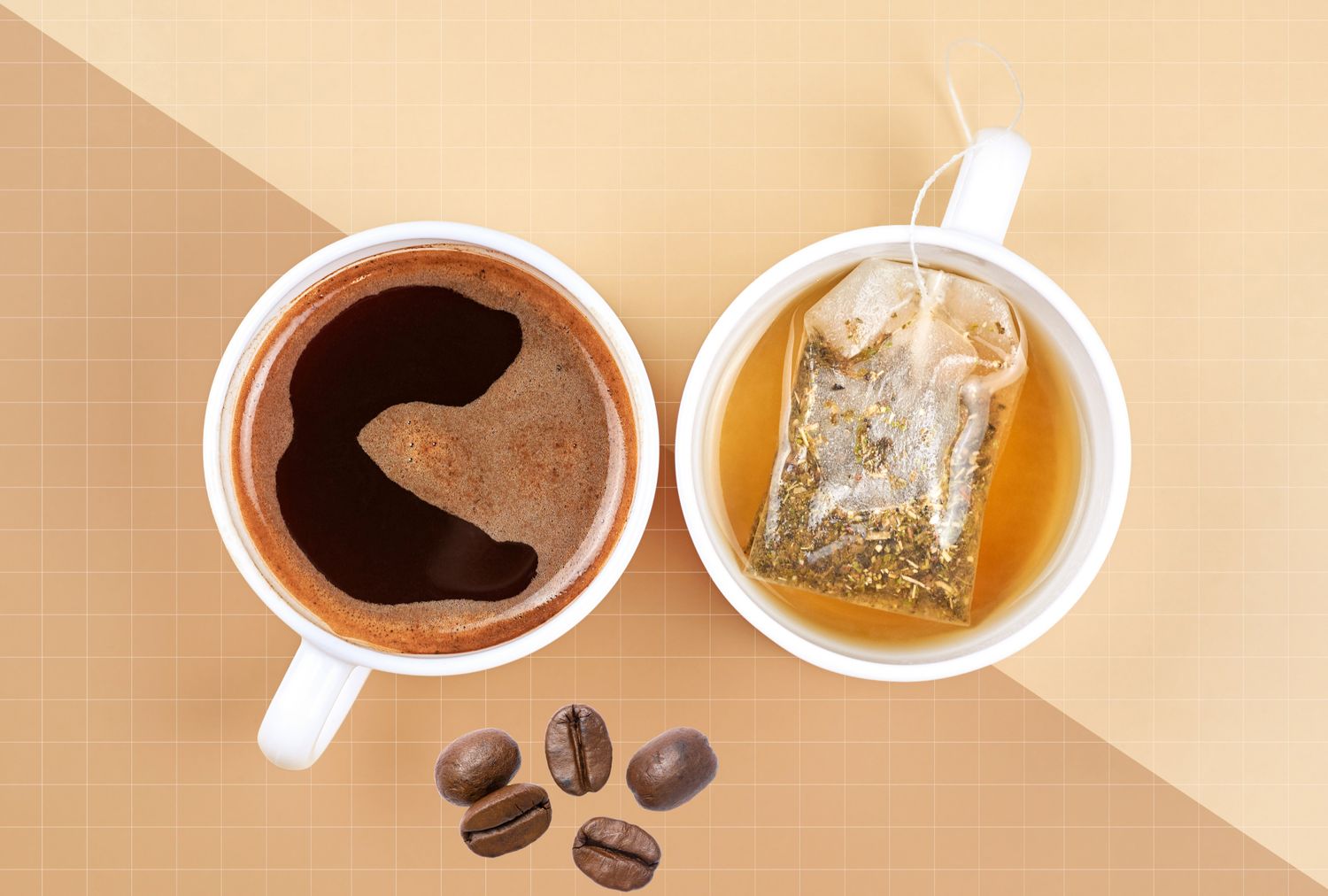Blog
Coffee vs. Tea: Which Is Healthier?

- Both rich in antioxidants, coffee and tea offer their own unique benefits.
- Coffee and tea boost focus and performance and support heart and brain health.
- Skip added sugar and heavy creamers for a healthier cup.
For centuries, coffee and tea have been among the world’s most cherished beverages. Whether it’s a bold cup of coffee to jump-start your day or a calming mug of tea to unwind at night, these drinks offer more than just comfort—they’re also packed with potential health benefits.
But when it comes to choosing the healthier option, which one takes the crown? If you have ever wondered whether coffee or tea is better for your health, read on. We’ve asked experts to break down the science to help you decide.
Health Benefits of Coffee
Coffee lovers, rejoice! This caffeinated beverage is more than just an energy booster. It comes with an impressive list of health benefits that can improve your well-being when consumed in moderation.
It’s Rich in Antioxidants
Antioxidants help protect your cells from damage caused by free radicals—unstable molecules that can raise your risk of chronic diseases like heart disease and diabetes. In particular, coffee is rich in chlorogenic acid, a powerful antioxidant that may support gut health, improve blood sugar control, protect against cognitive decline and promote heart health. In fact, research shows that coffee is one of the largest sources of antioxidants in the average Western diet.
It Supports Brain Health
Regular coffee consumption has been linked with a lower risk of neurodegenerative diseases like Alzheimer’s and Parkinson’s. In fact, one study found that drinking one to two cups of coffee per day was associated with a 32% lower risk of developing Alzheimer’s disease. Interestingly, the benefits appeared to extend up to four cups per day, but beyond that, the risk began to slightly increase—highlighting the importance of moderation.
One reason why coffee may protect against cognitive decline is that the caffeine in coffee boosts neurotransmitters like dopamine and norepinephrine, which may enhance brain function. “While coffee won’t cure these diseases, moderate intake is associated with a lower likelihood of developing them as you age,” shares Toby Amidor, M.S, RD, a registered dietitian.
It’s Good for Your Heart
Although too much caffeine can increase blood pressure temporarily, moderate coffee consumption has been associated with better heart health. In fact, a recent meta-analysis found that higher coffee intake was linked to a lower risk of developing hypertension (high blood pressure). Other studies have also connected regular coffee drinking to a reduced risk of heart failure and better cholesterol levels. These benefits may be due to coffee’s antioxidant and anti-inflammatory properties, which help protect cells from inflammation-related damage.
It Aids Physical Performance
There’s a reason coffee is a top pre-workout drink for many fitness enthusiasts—and why leading sports researchers recommend it as an ergogenic aid. In fact, a position statement from the International Society of Sports Nutrition concluded that caffeine can effectively enhance physical performance in athletes and non-athletes. So, before reaching for a pre-workout supplement, try enjoying a cup of coffee 30 to 60 minutes before your workout.
Health Benefits of Tea
Tea is an equally powerful contender when it comes to health benefits. Whether it’s green, black or herbal, this versatile drink offers its own unique treasures.
Source of Polyphenols
Technically, “true” tea comes from the leaves of Camellia sinensis, which includes green, black, oolong and white teas. This distinction is important because herbal teas differ in their nutritional benefits. True teas are rich in polyphenols, especially catechins and flavonoids, which have powerful antioxidant benefits. Green tea is especially known for its high levels of epigallocatechin gallate (EGCG), a compound with strong anti-inflammatory and cancer-fighting properties. These polyphenols may support overall health and help combat oxidative stress to lower your risk of chronic disease.
Promotes Heart Health
Like coffee, tea has been associated with improved heart health. A review of studies suggests that green tea consumption may benefit heart health by reducing key risk factors, like lowering both systolic and diastolic blood pressure as well as LDL (“bad”) cholesterol levels.
Experts believe these benefits come from the antioxidants in tea that fight oxidative stress and inflammation, which can damage the heart and blood vessels. These compounds also improve blood vessel function, increasing flexibility to support healthy blood flow and reduce strain on the heart.
Supports Digestive Health
If you’re a fan of herbal tea, rest assured—it offers health benefits too. In fact, certain types of herbal tea, like peppermint and ginger, can work wonders for your digestive system. These teas may soothe bloating, improve gut motility and even reduce nausea. “The compounds in certain herbal teas may aid digestion and can be a great option for a post-meal ritual,” says Amidor.
For example, peppermint has been used for centuries to help with digestive issues. It contains an active ingredient known as menthol, which has been shown to relax the muscles of the digestive tract. This muscle-relaxing effect can help reduce spasms and discomfort, making peppermint tea particularly useful for people who need digestive support.
It’s Calming
Unlike coffee, which is often praised for its energizing effects, tea tends to have a calming effect—thanks to a compound known as L-theanine. This amino acid promotes relaxation by increasing alpha brain wave activity and boosts calming neurotransmitters linked to focus and stress reduction. While tea does contain caffeine, L-theanine helps to counteract the jittery effects often associated with coffee.
The Final Verdict
When it comes to deciding whether coffee or tea is the healthier pick, there’s no clear answer. Both have unique benefits that make them excellent choices depending on your health goals and preferences.
“Coffee and tea both have research-backed health benefits, but the key is moderation,” explains Jaclyn London, M.S., RDN. Most experts suggest sticking to a maximum of three to four cups per day and being mindful of any added sugar or high-fat creamers that could diminish their positive effects.
How to Enjoy Coffee and Tea for Maximum Benefits
- For Coffee: For a healthier cup, opt for black coffee or add just a splash of milk. Ideally, skip the sugary syrups and high-fat whipped cream. If you prefer a smoother, less acidic taste, give cold brew coffee a try.
- For Tea: Green and black teas are fine on their own, but for added flavor, try adding a squeeze of lemon or a drizzle of honey.
It’s also important to listen to your body. Some people feel their best with tea, while others tolerate coffee just fine. But if coffee leaves you feeling jittery or anxious, swapping it for a calming tea may be the better option for you.
Our Expert Take
Whether you prefer the bold kick of coffee or the gentle comfort of tea, both can be a part of a healthy lifestyle—and each is a winner in its own right. Just remember that moderation is key and the way you consume these beverages plays a big role in their health benefits. So go ahead and sip your favorite brew with confidence, knowing that both are great picks for a healthier you.












